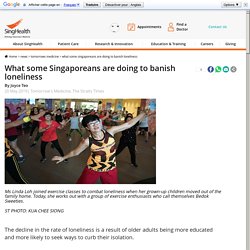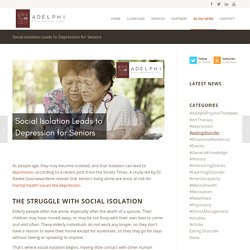

How Singapore Has Been Dealing with Social Isolation Amongst the Elderly. Seniors felt less socially satisfied, more isolated during Covid-19 circuit breaker period: Survey, Singapore News. SINGAPORE - Social isolation during the circuit breaker period resulted in lower social satisfaction levels for senior citizens, according to results from a monthly survey of about 7,500 people aged between 55 and 75 here. Social satisfaction levels dipped by about 4 per cent in May when compared with data from January. In particular, for senior citizens living with others, satisfaction levels fell to the pre-circuit breaker levels of peers living alone, while those living alone saw even lower satisfaction levels as safe distancing measures made it more difficult to find support from friends and the community.
As of July, while satisfaction levels have rebounded after the circuit breaker period, which was from April 7 to June 1, they are not back to the levels they were at before. As Singapore's population ages, the proportion of those who remain single and live alone will increase, said Prof Straughan, a sociologist and former Nominated Member of Parliament. What some Singaporeans are doing to banish loneliness - SingHealth. Ms Linda Loh joined exercise classes to combat loneliness when her grown-up children moved out of the family home.

Today, she works out with a group of exercise enthusiasts who call themselves Bedok Sweeties. The decline in the rate of loneliness is a result of older adults being more educated and more likely to seek ways to curb their isolation. Housewife Linda Loh felt lonely when first her mum and then her dad died more than a decade ago. Ms Loh, 60, used to spend her free time with her parents as her husband was based overseas for work as a regional accountant.
Then her 32-year-old daughter married in 2012 and moved out. "The first few months after they moved out, the house felt so empty," she said. "I stayed home alone and just did housework or I would go to the market to walk around. She realised then that she wanted to do something about her loneliness. Today, she attends workout sessions in the community with a group of exercise enthusiasts who call themselves Bedok Sweeties. Social Isolation Leads to Depression for Seniors. As people age, they may become isolated; and that isolation can lead to depression, according to a recent post from the Straits Times.

A study led by Dr. Nadee Goonawardene reveals that seniors living alone are most at risk for mental health issues like depression. The Struggle with Social Isolation Elderly people often live alone, especially after the death of a spouse. Their children may have moved away, or may be too busy with their own lives to come and visit often.
That’s where social isolation begins. Seniors often struggle with physical ailments that make it difficult to get out and walk, go shopping, or catch the train to visit a friend. The 2016 Study of Isolated Seniors Dr. According to the study, those who were socially isolated spent more time napping, more time sitting in the living room, and more time indoors than the rest of the seniors in the study. Help for Seniors Living in Isolation News Feed from Adelphi Psych Medicine Clinic. Social isolation and the elderly poor in Singapore. SINGAPORE: Her one-room flat was a cluttered mess, and Madam Helen Fernandez herself never seemed to bathe, said her neighbours who always saw her in the same set of clothes.
When case workers first visited the unkempt and confused elderly widow, they had to rush her to hospital for very high blood pressure – which resulted because she hadn’t been taking her medication and had been missing doctors’ appointments. Since her husband died 17 years ago, Mdm Fernandez had been living alone with no friends or family – and slowly falling prey to loneliness and dementia. There were times when she’d even call up the police just to talk. It was how her case got referred to the Social Service Office, and then to case worker Ahmala Rajoo in 2015.
“She was receiving financial assistance, about S$500 a month,” said Ms Ahmala, a care executive with NTUC Health Cluster Support in Bukit Merah. But the neatly-groomed Mdm Fernandez you meet today almost doesn’t seem the same person. Caregiver support.